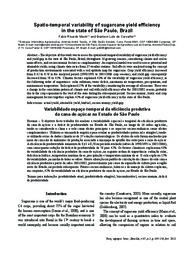Spatio-temporal variability of sugarcane yield efficiency in the state of São Paulo, Brazil.
Spatio-temporal variability of sugarcane yield efficiency in the state of São Paulo, Brazil.
Author(s): MARIN, F. R.; CARVALHO, G. L. de
Summary: The objective of this work was to assess the spatial and temporal variability of sugarcane yield efficiency and yield gap in the state of São Paulo, Brazil, throughout 16 growing seasons, considering climate and soil as main effects, and socioeconomic factors as complementary. An empirical model was used to assess potential and attainable yields, using climate data series from 37 weather stations. Soil effects were analyzed using the concept of production environments associated with a soil aptitude map for sugarcane. Crop yield efficiency increased from 0.42 to 0.58 in the analyzed period (1990/1991 to 2005/2006 crop seasons), and yield gap consequently decreased from 58 to 42%. Climatic factors explained 43% of the variability of sugarcane yield efficiency, in the following order of importance: solar radiation, water deficit, maximum air temperature, precipitation, and minimum air temperature. Soil explained 15% of the variability, considering the average of all seasons. There was a change in the correlation pattern of climate and soil with yield efficiency after the 2001/2002 season, probably due to the crop expansion to the west of the state during the subsequent period. Socioeconomic, biotic and crop management factors together explain 42% of sugarcane yield efficiency in the state of São Paulo.
Publication year: 2012
Types of publication: Journal article
Observation
Some of Embrapa's publications are published as ePub files. To read them, use or download one of the following free software options to your computer or mobile device. Android: Google Play Books; IOS: iBooks; Windows and Linux: Calibre.
Access other publications
Access the Agricultural Research Database (BDPA) to consult Embrapa's full library collection and records.
Visit Embrapa Bookstore to purchase books and other publications sold by Embrapa.

